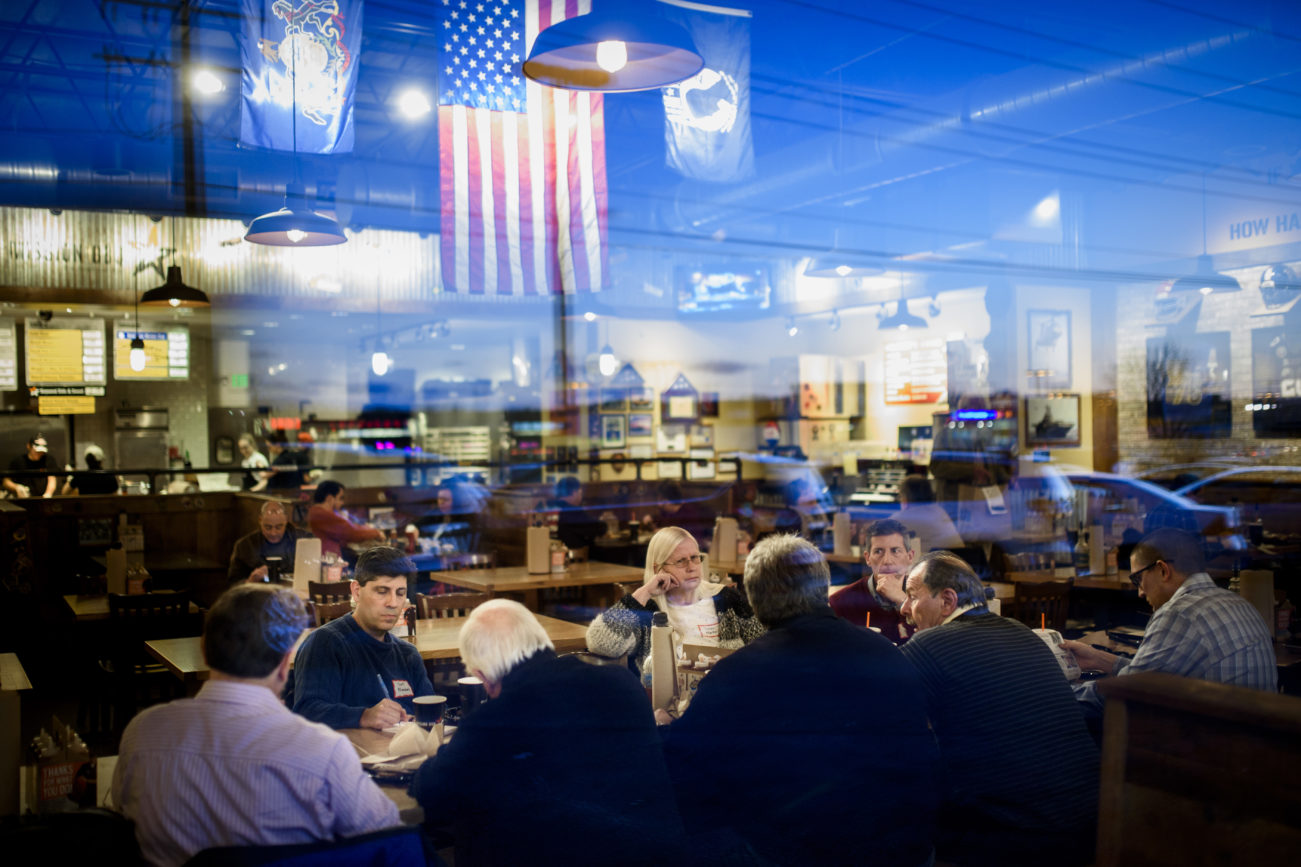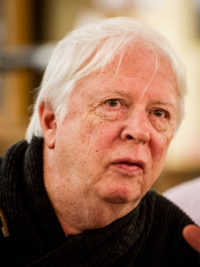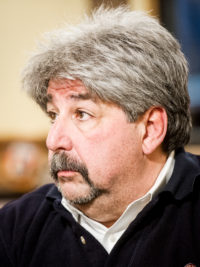Joe Ambrosio picked up a copy of the York Daily Record and flipped through the A section, like a tour guide. Four other readers and three of the paper’s editors followed along. We sat at two long wooden tables at Mission BBQ in York, Pennsylvania, talking about local journalism and accusations—now on a rolling boil across the country—that too many journalists have left-wing agendas. Ambrosio, a trade association staffer, turned pages, then stopped, using his hand to frame the day’s editorial.
“And this is your impact.” That matters to him, he said: It’s a newspaper’s duty to take a stand.
But Ken Iman, another reader sitting to Ambrosio’s left, said that’s what he doesn’t want—to be told what to think. He wants more national and international news.
The York Daily Record, owned by Gannett, serves a south-central Pennsylvania county and reaches about 53,000 print readers on Sundays. We’re grounded in local news, yet some would like to incinerate us along with the national media they revile.
That’s why we had been trying to get our most extreme critics—like the one who called us “Satan” on Facebook—to meet with us. The five readers at the restaurant weren’t among our harshest social media commenters, but their opinions gave us clues about the views of torch bearers who say that we are fake news and hope we go out of business. The question is, are we neighbors invested in a healthy community? Or can we no longer recognize each other?
York, about an hour north of Baltimore on I-83, was settled in the mid-1700s by German immigrants. The city hosted the Continental Congress when it fled the British in the winter of 1777, and surrendered to Confederates who then fought in Gettysburg in 1863. During World War II, its humming manufacturing sector was key to the war effort. People still remember the race riots here in the late ’60s that led to two murders, and that 30 years later, partly in response to press reports, prosecutors launched investigations into the killings, which resulted in guilty pleas and convictions.
The city of roughly 45,000 is lately nurturing a restaurant-and-craft scene. The county is moving from making things—though Harley-Davidson remains—to whatever comes next. It’s Republican turf. York County gave President Trump 62.5 percent, and some of his fans paired their support with online artillery fire at our newsroom.
We rarely fire back; we post stories, and let people talk—even when they rage at us.
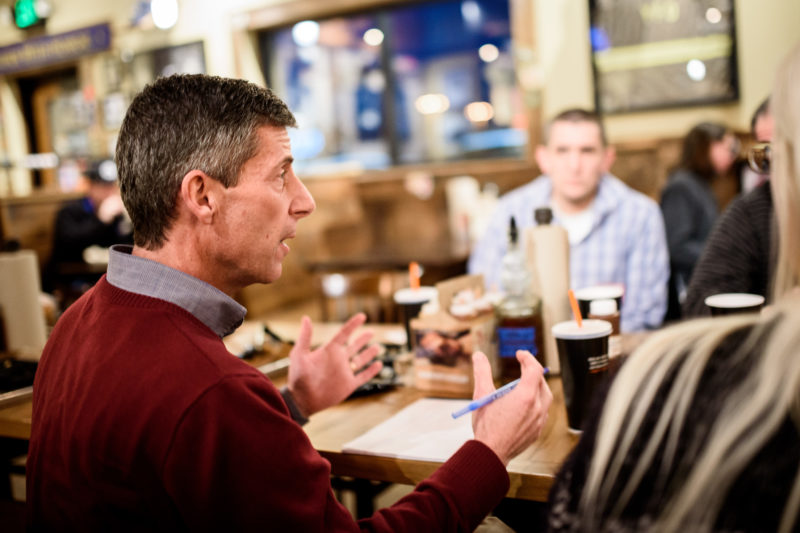
Scott Fisher, who oversees opinion pages at the York Daily Record, talks with readers at the February meeting. (Photo by Jeff Lautenberger)
That works for me. I don’t seek confrontation. But four days after Trump won, we posted a story about hate incidents across the US. We had reported on one: A video, shot inside a local school, showed students carrying a Trump sign and someone calling out “white power.”
On Facebook, someone wrote: “How about you report both sides? There have been trump supporters who have been beaten and discriminated.” We had—before and after the election. Did she miss the stories? Dismiss them? Two comments seared me:
“YDR won’t be happy until there’s a Riot in York . . . and some places get burned down and people die,” and, “Thank God for the Internet which will soon completely put you and all the others out of business.”
Move on, I told myself.
But the country had just elected a president who campaigned in part on a hatred of journalism. And, I thought to myself, I want people to die in a riot? My newsroom sponsored hate incidents?
We can disagree. But not like this. I cleared a plan with other editors, then breathed deep and typed on Facebook: I’ve read what you’re saying about us. Let’s get together and talk. Some commenters told me, in effect, to go to hell. One said it was a scheme to gather President Trump’s supporters as a setup for a drive-by shooting. (I took it as a joke, but still . . . ) Too few readers signed up, so we canceled.
Our next idea was to bring people into the office on inauguration eve. This time, in the open invitation, I addressed some of the most vehement commenters by name.
I kept thinking about one retort on the original invite: You’re “asking the hens to come into the foxhole . . . so you can ‘talk journalism’ (though I dont know if any/all of you ARE journalists . . .) Why? So you can try to belittle their opinions and invite them to the dark side?” No, I thought. That’s not it at all. I wanted to know how keyboard critics who once had sparred with their local newsroom in healthy ways could now call us the enemy and say, as one did, that the Daily Record’s goal is “causing us . . . to destroy each other.”
They were due at 6 pm on January 19: One had angrily commented on the story about post-election hate incidents, another on my column asserting that honest mistakes are not fake news. A third had tweeted about fake news. Scott Fisher, our engagement editor, and I waited five, 10, 15 minutes. I checked the door and messages. Would they show? Should we just eat the pizza?
I’ve been a journalist for 31 years, 16 as an editor at the Daily Record, where I edit enterprise stories. I can take a shot, but I’m done being told what drives my newsroom. (A political agenda? Please.) The fire breathers online don’t know what’s in my heart, or why we do this job.
Yet their words are embers of something urgent and real for local journalists. In the past, we’d written off apocalyptic commenters, but we can’t anymore—not when our calling and colleagues are vilified from the country’s loudest megaphone. I couldn’t care less about the politics. I care about the anger. I care when we’re accused of fake news, and that some of our neighbors want to put their hands around our throats.
So I was ready to listen—but to challenge them, too.
They never showed. At 6:20, we were still sitting in an empty conference room. I grabbed a slice. My boss ducked in and out: “Sorry you got stood up.” Our news director joined us. We discussed doing something more formal, maybe outside the office.
One day in late January, a bunch of editors sat around a table talking about whether online headlines should report a politician’s claim, for example, that millions voted illegally, or say there was no evidence to support the statement. These are the kinds of things we have to figure out now that we know a chunk of our readers think we’re the ones who lie.
Kim Strong, one of the editors, suggested that if a baseless statement is the story, we use a headline that says so. If it’s only part of a larger story, use a traditional headline but fact-check it later. That got some of us nodding. But still, I said, that challenges my view that news stories shouldn’t tell readers what to think. If we say we’re telling the truth, we’ll be called out: Whose truth? Your politics oppose mine. You have no right to truth.
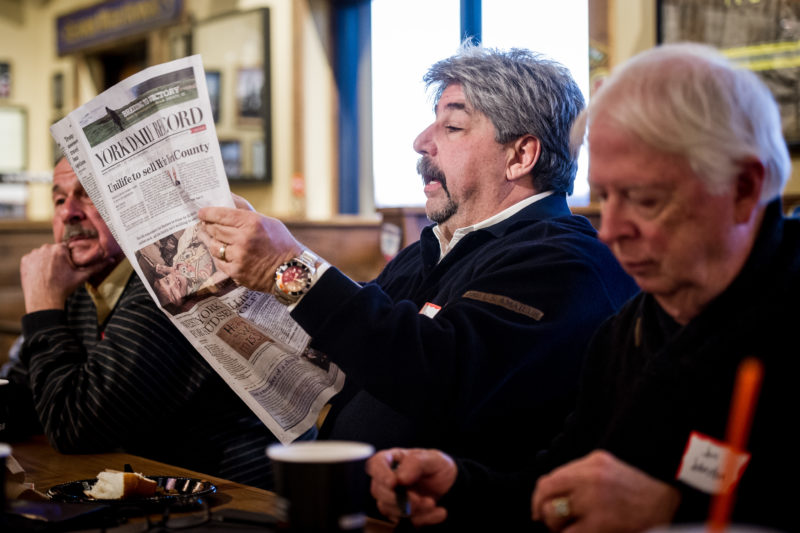
Joe Ambrosio flips through a recent edition of the York Daily Record during a discussion with YDR editors. (Photo by Jeff Lautenberger)
It’s clear from Facebook that people think simply covering news is evidence of political affiliation: If we report on post-election hate incidents, that’s proof we’re anti-Trump and stoking the resistance.
Jim McClure, the Daily Record’s longtime editor, scribbled notes as we talked. “Maybe we’re in a new day” when it comes to engaging on Facebook, he said. We could be more assertive when we see something about us that’s wrong.
That can be perilous. Decades of anti-journalism rhetoric directed at national news organizations has kindled flames in smaller communities. Readers who warm their hands by that fire no longer see a difference: CNN and the Daily Record are basically the same. Local journalists are looking for ways to change that. I think we have to produce credible, independent journalism to help strong, problem-solving communities thrive, do it over and over again, and do it better. And, more than ever: find people who will tell us why that isn’t good enough.
On our third try, we got our face-to-face: Five readers—two who responded to the Facebook post, two letter-writers we invited, and one who writes an occasional op-ed column on local issues for us—met three editors at the barbecue joint in mid-February. Gary Markle, the columnist, pointed to the Daily Record’s coverage of the pro-Trump school video and the “white power” statement. “There were a lot of unfounded allegations of racial slurs. What did that do? It stirred everybody up,” he said. I heard: That’s your agenda at work.
Readers Derek Merson, Gary Markle, Ken Iman, Jon Johnston, and Joe Ambrosio (left to right) discussed their misgivings about coverage with York Daily Record editors. (Photos by Jeff Lautenberger)
Fisher, our engagement editor, asked the group to role-play: Was the incident newsworthy? Let’s say it is, said Markle, a retired teacher and coach with the voice projection of a teacher and coach. You have to understand the effect: “Who’s gonna be hurt by this? Is it for the good of the community? It’s gonna look like there’s a lot of racism at Vo-Tech.”
Fisher: Should we worry about that, or report the news?
Derek Merson, a Navy veteran who twice lost jobs in the recession, said simply, “The story’s there.” Ambrosio, an official with the statewide restaurant and lodging association, said he thought it was a tough decision for us.
Our group included Jon Johnston, an Army vet, and Iman, a retired college professor who had called the Daily Record “an embarrassment” in a letter to the editor. They were not the Facebook haters, but they weren’t there to coddle us, either. Markle had brought a list of journalism ethics and said we fell short. Johnston chided us for labeling some politicians “far right,” but none “far left.” Iman noted that he had a master’s degree. “I’ll tell you who to vote for,” as opposed to us telling him. “Get over yourselves! I want news.”
Complaints about fairness flared. Markle assailed our coverage of State Sen. Scott Wagner—Republican, York Countian, businessman, millionaire, gubernatorial candidate—compared to coverage of Gov. Tom Wolf, Democrat, York Countian, businessman, millionaire, gubernatorial candidate. The paper scrutinized Wagner’s finances, Markle said, but Wolf? “You haven’t done this much against Wolf as you have against Wagner,” he said, thumb on forefinger, voice rising.
In fact, we have—though it’s accountability journalism, not “against” anyone. We reported deeply on how Wolf the candidate’s plans lacked specifics. We later reported that his blind trust was to be managed by a cousin. “How blind is Gov. Tom Wolf’s blind trust?” the headline read.
Markle asked me to send him the stories. The conversation moved on to other topics, such as how we choose political cartoons and whether we use stories from wire services. The glimpse behind the scenes gave them something to consider.
I couldn’t care less about the politics. I care about the anger. I care when we’re accused of fake news, and that some of our neighbors want to put their hands around our throats.
Those at the table were dedicated and thoughtful, if sometimes angry, newspaper readers who were invested in the discussion. Even so, tension crackled. Markle said he didn’t understand why we had made a certain decision. In trying to rephrase his point and go deeper, I said, “So what you don’t know is . . .” and he interrupted sharply: Oh, by all means, tell me what I don’t know, please!
Markle, though, ripped people who seek the echo chamber. He spurns Rush Limbaugh and Rachel Maddow equally, he said. Ambrosio conjured an ideal world in which, he said, people would “read or watch the news, check facts, do research” and decide for themselves. “It doesn’t happen. Everybody runs home to mama.” Meaning: their political womb. Johnston banked the night’s fire. “Every paper has a bias, left or right,” he said. “You guys try to be fair and neutral. In my mind, I think you lean slightly left. I’m not losing sleep over it.”
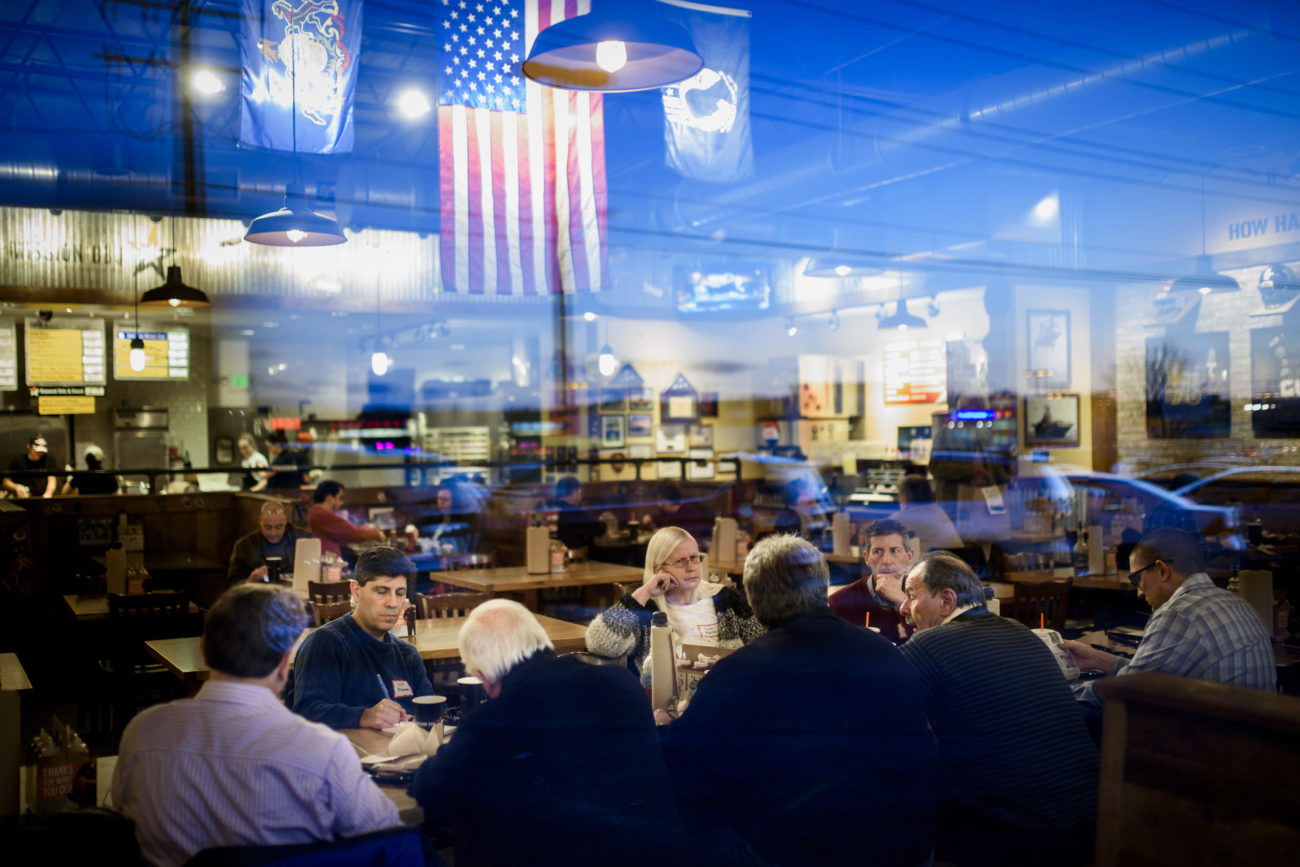
York Daily Record editors Scott Blanchard, Susan Martin, and Scott Fisher meet with readers at Mission BBQ in York, Pennsylvania.
One theme emerged from our evening at Mission BBQ: Some readers believe our news reporting is meant to send signals. I read them part of a great piece danah boyd recently wrote on Medium asking, “Did media literacy backfire?” “Polarization, distrust, and self-segregation” are tearing us up, she wrote, with help from “our culture of doubt and critique, experience over expertise, and personal responsibility. . . . Media literacy asks people to raise questions and be wary of information that they’re receiving. People are. Unfortunately, that’s exactly why we’re talking past one another.” I asked our guests: Are we?
Johnston told a story: At Thanksgiving, he went to a relative’s house. Posted on the door was a sign: “No politics.” Sixteen people were there for dinner—“two of us felt one way, 14 felt the other,” he said. “There was no attempt at communication. The other side does not want to hear it.”
It’s risky for news organizations and readers to ignore each other. Our discussion underscored that good journalism matters to strong communities. But it’s also clear that some people have changed what they expect from news organizations, what they are willing to pay for, and how they define journalism. We need to talk about that. But not just through keystrokes. Readers who’ve given up on journalism, and journalists who don’t understand why, must shake hands and get reacquainted. I think, peering through the political smoke, we’d recognize each other as neighbors.
Scott Blanchard is enterprise editor at the York Daily Record, Pennsylvania’s Newspaper of the Year for 2016. He contributed to award-winning coverage of the 30-year-old York riots investigation. Blanchard was a 2013 Ochberg Fellow at the Dart Center for Journalism and Trauma at Columbia. He teaches at York College.

